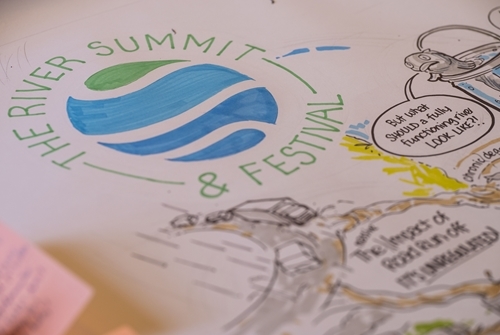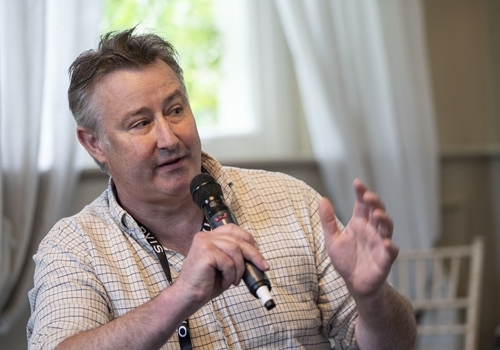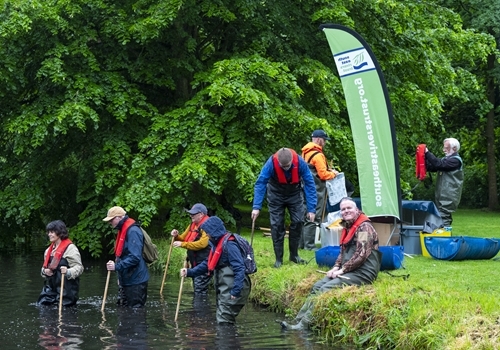
Lucy Young Photos - @lucyyoungphots
More than 250 people came together on Tuesday for the 2024 UK River Summit at Morden Hall in London to talk about the range of issues affecting our rivers.
“It’s not all about sewage” was the title of the panel discussion led by the GWCT’s head of fisheries Dylan Roberts. He spoke about the steep decline of migratory fish in Europe but especially Wild Atlantic Salmon, where numbers have dwindled by 80% in the past 40 years and as a result are classified as endangered in the UK. “In another 30-40 years we might not have these fish in our rivers,” he warned.
“There are a myriad of issues, some of them even bigger than sewage, causing major issues and big damage to our rivers. The biggest factor is climate change.
“Climate change is warming our rivers and seas in both spring and winter. Salmon is a cold water species that require high levels of oxygen and cold, clean water. Unfortunately, the are now living in warming, polluted, dirty water, and with less water in many areas where there are obstruction and abstraction issues.”
“They face issues of agricultural run off - sediment basically mud, from ploughed fields getting into rivers clogging the gravel in which salmon spawn reducing egg survival. The mud also brings with it a cocktail of nitrate, phosphate which causes excessive algal growth that strips oxygen from the water at night and chemicals. Climate change is exacerbating the impacts of all this.
“I am not against farming – we have to eat, we have to have food – and I ‘m not against the farmers – they have been forced to work under these regulatory food production systems for the past 40 or 50 years.
“The government has prioritised cheap water and cheap food for far too long and what we see in our rivers and their associated wildlife today is the result of those policies.”
“It’s about time we get serious and think about prioritising the environment a bit higher up the agenda – like politicians do with cheap water and cheap food. Come on let’s look after our rivers and our environment.”

Lucy Young Photos - @lucyyoungphots
The event brought together environmentalists, policy makers, regulators, campaigners, anglers, media, businesses, politicians and members of the public who all share a desire to work towards a more positive future for our rivers.
Also speaking at the event as part of the “Future of Farming” panel was Robin Leech, an ecologist working with Wylye Valley Farmers to improve the water quality in the River Wylye.
He said: “It is at events like this that we can really get engagement in improving our water quality and riverine biodiversity.
“The point we really wanted to get across at the summit was that to really deliver the improvements which are needed, there has be to widescale engagement with farmers who manage 72% of England’s land.”
He said farmer led collaborations such as clusters and the Environmental Farmers Group (EFG) are key to making this happen while also making sure farmers are fairly rewarded for the actions they take along the river and meadowland.
He said: “The Wylye Valley Farmers’ landscape recovery project has been able to bring over 20 landowners together to reconnect 14km of this SSSI chalkstream with its floodplain.”
Other speakers ranged from Philip Duffy, CEO of the Environment Agency, Lawrence Gosden, CEO of Southern Water, Penny Gane, Head of Practice at Fish Legal, Feargal Sharkey, Jim Murray and Dr Jack Hogan who spoke about the “The History of the River Wandle”.

Lucy Young Photos - @lucyyoungphots
Morden Hall is set on the River Wandle, a unique chalk stream flowing through an heavily urbanised area intertwining a rich historical past with a current ecological importance.
Commenting on the event, Claire Zambuni, founder of The River Summit & Festivals said: “The doors may have closed on The UK River Summit 2024, but the conversations that have begun as a result of this event are open-ended.
“With such a diverse range of environmental stakeholders having stood together under one roof, on an independent platform, and in an engaging and unique atmosphere filled with creative expression, there is now a concrete trajectory for tangible change for our rivers. The UK River Summit brought together the stone throwers and there are definitely ripples of change in the water now.”
The UK River Summit was curated by an independent team comprising of Claire Zambuni, Emma Sandham and Iona Mackay.
The event offered interested parties the opportunity to build relationships and network while also finding time to celebrate our rivers, engage in community-led initiatives, and experiences based on the river Wandle.